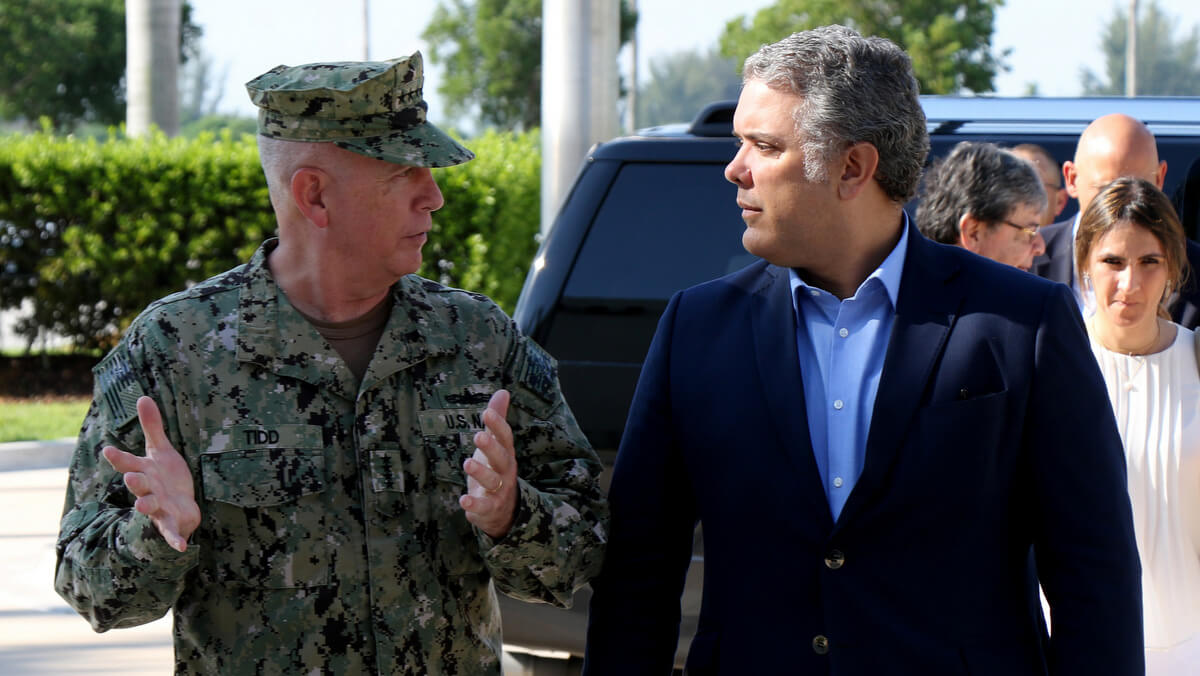BOGOTA, COLOMBIA – Colombia’s new right-wing President Ivan Duque has announced that he will begin the formal process of ending his country’s participation in the Union of South American Nations (UNASUR), making good on his campaign promise to remove Colombia from a regional body he sees as acting in league with the elected government of Venezuelan President Nicolas Maduro.
“As you know, for several years I publicly denounced Colombia’s participation in UNASUR, [which] is an institution that has lent itself, through its silence and complacency, to the brutal acts of the dictatorship of Venezuela against its citizens,” Duque told reporters while standing alongside Foreign Minister Carlos Holmes Trujillo.
Colombia’s decision to pull support from the bloc is “irrevocable,” Duque added, noting that in six months the process of withdrawal would be complete.
The move is the latest in a series of blows against the project of steering the countries of Latin America away from the hegemonic grip of the United States, and came in spite of protests by Bolivia that Colombia not move forward in its withdrawal from the body.
UNASUR: “21st-century socialism” versus neocolonial servitude
The constituent treaty of the 12-member regional bloc was signed in 2008 amid the historic tide of “21st-century socialist” governments led by such figures as Venezuela’s Hugo Chavez, Brazil’s Luiz Inacio “Lula” da Silva, and Ecuador’s Rafael Correa. UNASUR was seen as a means to advance national independence, pan-American solidarity, and social development versus the neocolonial status, neoliberal debt peonage, and U.S. militarization the region had suffered.
Member states saw UNASUR as a vehicle for integrating South America in terms of educational advancement, infrastructure development, production and commerce, military-technical collaboration, and joint decision-making.
Washington had long treated the region as its “backyard” and greeted the so-called “pink tide” with various moves meant to prevent nations from breaking from their historic dependency on U.S. imperialism.
UNASUR was also meant to provide an alternative to the Free Trade Area of the Americas (FTAA), a neoliberal trade bloc that the U.S. was strongly pushing at the time. Previous such trade blocs were views as cautionary tales, as the 1994 North American Free Trade Agreement (NAFTA) had largely devastated the working class and rural poor in less-developed Mexico, leading to the destruction of the country’s social fabric and explosive growth of crime, corruption and poverty.
For late Venezuelan leader Hugo Chavez, UNASUR would provide a model of economic and political unity that actually served the people of the Global South.
The organization was also meant to provide a credible alternative to the Washington-based Organization of American States (OAS). While defenders of the OAS such as Duque see the body as the foundation of the “inter-American system,” critics have called it the “U.S. Ministry of Colonies,” owing to its history of criticizing left-wing governments while turning a blind eye to rights abuses committed by security forces in countries traditionally ruled by right-wing oligarchies, such as Mexico or Colombia.
Divided we fall
In an interview earlier this month with pan-Latin American television network teleSUR, former Colombian President Ernesto Samper blasted the “disintegration process” taking place in Latin America as “simply suicide” promoted first and foremost by Washington. Samper added:
UNASUR is much more than these episodic problems between one or two countries. UNASUR has right now a public policy agenda on health, employment, infrastructure, and technology.
What will we do if we end those integration projects? Are we going to stop buying vaccines together? Are we going to turn our backs on the 1.5 million South Americans who work with UNASUR’s temporary work permits? That is what the region must think about.”
UNASUR has been awash in crisis ever since April, when Colombia along with Argentina, Brazil, Chile, Paraguay and Peru announced the temporary suspension of their respective memberships in the organization.
Each of the countries that suspended their participation has a largely pro-Washington orientation and has spoken out against Caracas, as Venezuela has suffered from political pressures and economic warfare, seeing a crisis of emigration spiral out of control in recent months.
According to Colombian Foreign Minister Trujillo, the leaders of Argentina, Chile and Peru had also “wanted to take the same course” as Colombia’s president but had not completed consultations with Bogota at the time of Duque’s announcement.
The failure of other countries to co-sign the withdrawal could prove significant: earlier this month, during the swearing-in of Paraguay’s newly-elected President Mario Abdo Benitez, Foreign Ministers Jose Valencia of Ecuador and Jorge Faurie of Argentina pledged the need to reactivate UNASUR.
Feature Photo | U.S. Navy Adm. Kurt Tidd, commander of U.S. Southern Command (SOUTHCOM), escorts Colombian President-elect Ivan Duque at the command’s headquarters in Doral, Fla., July 14. Photo | SOUTHCOM
Elliott Gabriel is a former staff writer for teleSUR English and a MintPress News contributor based in Quito, Ecuador. He has taken extensive part in advocacy and organizing in the pro-labor, migrant justice and police accountability movements of Southern California and the state’s Central Coast.


